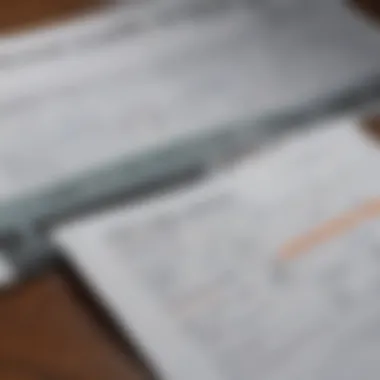Understanding the Consequences of Collection Bills


Intro
Facing a bill sent to collections is a situation many people dread. It can lead to various financial troubles and complicate personal finances considerably. Understanding the intricacies of this process is essential for those who want to navigate it successfully. A bill going to collections can impact not only one’s credit score but also the ability to secure future loans.
Overview of the Financial Topic
Definition and Importance
A collection happens when a creditor refers an unpaid bill to a third-party collection agency. This process often occurs after several unsuccessful attempts by the creditor to collect money directly. Understanding this topic is crucial because it reflects one's financial health and responsibility. More importantly, it outlines risks and possible strategies to mitigate negative outcomes.
Key Terms and Concepts
There are several key terms that you should be familiar with:
- Creditor: The original entity or institution that is owed money.
- Collection Agency: A company that specializes in recovering funds on behalf of creditors.
- Credit Score: A numerical representation of a person's creditworthiness.
Having a clear grasp of these terms helps demystify the consequences of bills sent to collections, making any discussions with creditors easier.
Implications of a Bill Sent to Collections
This section will explore the financial, legal, and emotional ramifications of a bill being sent to collections.
Financial Ramifications
Unpaid debts and bills can have significant effects on one's overall financial status. When a bill goes to collections, it can lead to:
- Increased Debt: Collection agencies often add fees that increase the total amount owed.
- Credit Score Damage: A collection entry can lower credit scores significantly, making future borrowing difficult.
Legal Consequences
Debtors’ rights vary by jurisdiction, but generally:
- Collectors can legally pursue the debt through calls, letters, or in some cases, lawsuits.
- Ignoring a collection notice can lead to legal actions against you, resulting in garnished wages or seized assets.
Emotional Strain
The psychological impact is often overlooked. Dealing with collections can cause:
- Stress and anxiety about finances.
- Feelings of shame or stigma related to debt.
Steps Toward Implementation
To avoid facing collections, investing time into managing bills is essential.
Practical Steps for Users to Take
- Set Reminders: Use your phone or planner to track payment due dates.
- Budget Wisely: Allocate funds to ensure all bills are paid on time each month.
- Communicate Actively: Reach out to creditors if financial difficulties arise.
Tools and Resources for Assistance
- Tools like budgeting apps can simplify monitoring finances. Examples include Mint and YNAB.
- Financial education resources are available at sites like Wikipedia and Britannica.
Important Considerations and Warnings


- Avoid ignoring collection agencies. Legal action can escalate quickly.
- Be cautious of scams. Not every caller is legitimate. Always verify identity.
The End
It is paramount to understand the implications of a bill sent to collections. Awareness and proactive financial management can significantly mitigate the risks associated with collections. By knowing the potential consequences, individuals can make informed decisions and take necessary steps to safeguard their financial health.
Understanding the Collection Process
Understanding the collection process is crucial for anyone who finds themselves in a situation where a bill has gone to collections. This knowledge can serve as a protective measure to safeguard one's financial health. By recognizing the nuances involved in debt collection, consumers can better navigate their obligations and make informed choices about managing their finances.
Firstly, it is essential to comprehend that the collection process often signals a missed payment or an unresolved balance. This situation creates a ripple effect on various aspects of a person's financial life. It may impact credit scores, restrict access to future loans, and influence financial stability. Therefore, being informed about how collections work can lead to proactive measures that help avoid further complications.
Consumers should also consider the legal ramifications that come into play when a bill is sent to collections. Understanding rights under laws, like the Fair Debt Collection Practices Act, empowers individuals to stand firm against any potential abuses by debt collectors. Additionally, grasping the reasons why bills go to collections can help consumers avoid making similar errors in the future.
In summary, a clear understanding of the collection process not only eases the anxiety often associated with debt but also equips individuals with vital tools for financial recovery.
What It Means for a Bill to Go to Collections
When a bill is sent to collections, it signifies that the creditor has determined that the debt is extremely overdue. This generally follows a period of unpaid invoices and attempts to contact the debtor for payment. Once a bill reaches the collection stage, the original creditor typically refers the account to a third-party collection agency. This agency specializes in recovering outstanding debts but operates under strict regulations.
The consequences of this action can be significant. A collection account may appear on a consumer's credit report, leading to a decline in their credit score. Furthermore, it is important to note that collection agencies often employ persistent tactics to secure payment. This pressure can exacerbate the stress consumers face, making it essential to approach the situation with knowledge and strategy.
"Being sent to collections is not just an administrative procedure; it often marks the start of serious financial implications for the consumer."
Common Reasons for Collections
There are several reasons why a bill may end up in collections. These reasons often stem from various life circumstances or financial management issues. Here are some common contributors:
- Medical Expenses: Unexpected medical bills can lead to financial strain and unpaid debts.
- Credit Card Debt: Failure to keep up with credit card payments is a primary reason for collections.
- Loan Defaults: Personal loans or auto loans that become delinquent can also lead to collections.
- Utility Bills: Unpaid utility bills, such as electricity or water, often result in collections.
- Other Situational Factors: Job loss, divorce, or other life changes can impact a consumer's ability to pay.
Understanding these factors can help consumers identify potential risks in their financial behavior. It can also empower them to seek solutions before debts escalate to the collections stage.
The Lifecycle of Debt Collection
Understanding the lifecycle of debt collection is crucial for consumers to navigate its implications effectively. When a bill is sent to collections, it initiates a series of steps that can significantly impact one's financial health. Gaining insight into this lifecycle allows individuals to make informed decisions and better manage their obligations.
Initial Notification from Creditors
The initial notification is often the first indicator that a consumer is nearing the collections stage. Creditors usually send a series of reminders and warnings when a bill becomes overdue. This process serves multiple purposes:
- It gives consumers the opportunity to address the debt before it escalates.
- It highlights the importance of communication between the creditor and debtor.
- Prompt action can alleviate stress and prevent further complications.
During this stage, consumers should take every notification seriously and evaluate their financial situation. If necessary, reaching out to the creditor can lead to establishing a payment plan or negotiating terms.
Transfer of Debt to Collections
Once the efforts from the creditor fail, the debt is typically transferred to a collection agency. This transition signifies several important aspects:
- The original creditor now hands over the responsibility of the debt management to a third party.
- The collection agency will likely begin its own efforts to recover the owed amount.
At this point, consumers receive a formal notice indicating that their debt is now in collections. This notice is crucial as it contains vital information regarding the debt, including the amount owed and the agency managing the recovery process. Ignoring these communications can lead to further consequences.
The Role of Collection Agencies
Collection agencies are entities created to follow up on debts that are in default. Their role covers several key functions:


- Recovery of Funds: Their primary goal is to recover the unpaid amounts for creditors.
- Collection Practices: Agencies may adopt various collection strategies, from phone calls to letters.
- Reporting to Credit Bureaus: Agencies often report debts to credit bureaus, which can negatively affect a consumer's credit score.
It is vital for consumers to recognize that collection agencies must comply with guidelines set forth by laws such as the Fair Debt Collection Practices Act. This legislation exists to protect consumers from abusive debt collection tactics. Familiarizing oneself with these rights can empower consumers when interacting with collection agencies.
Implications for Consumers
Understanding the implications of a bill sent to collections is crucial for consumers. This stage can lead to significant consequences that can affect financial stability and future borrowing capabilities. The transition of a bill to collections often signals that previous attempts to settle a debt have failed, and it is essential to grasp what this means for you as the debtor.
The consequences can range from immediate financial strain to long-term impacts on personal credit scores. Awareness of these implications equips consumers with the knowledge they need to navigate their financial landscape more effectively. It also encourages proactive approaches to debt management and payment processing.
Impact on Credit Scores
When a bill is handed over to collections, it usually results in a negative mark on the consumer's credit report. This can adversely affect your credit score, which is a key factor lenders consider when assessing risk for loans and credit cards. According to many financial experts, a drop in score can be quite steep, often between 80 to 100 points. Over time, the lingering effects of a collection entry can last for seven years, which can hinder future credit approvals.
To mitigate this impact, it is vital for individuals to address debts before they escalate to collections. Timely payments and open communication with creditors can help prevent detrimental marks on your credit profile.
Legal Rights Under the Fair Debt Collection Practices Act
The Fair Debt Collection Practices Act provides important protections for consumers facing debt collections. Under this law, debt collectors are restricted in how they can communicate about debts. For example, they cannot harass or threaten consumers, nor can they contact individuals during inconvenient times.
Consumers also have the right to request validation of the debt being collected. This means that if you believe a collector is pursuing a debt incorrectly, you can ask for documentation that proves the debt is valid. Understanding these rights is crucial; it allows consumers to stand firm against potential abuses by aggressive collection agencies. Utilizing your rights can lead to a more fair and respectful handling of debt issues.
Potential for Lawsuits and Garnishments
The situation can escalate further if debts remain unpaid even after reaching collections. Creditors may resort to legal action to recover their funds. A lawsuit can result in court judgments against you which can lead to wage garnishment, where a portion of your paycheck is withheld to pay off the debt. This can create a strain not only on your finances but also on your livelihood, as a significant portion of your income could be taken away.
Being informed about the potential for lawsuits and garnishments helps consumers prioritize debt payments. Proactive negotiations with creditors can potentially lead to payment arrangements or settlements to avoid such legal actions.
Strategies for Addressing Collections
Addressing collections effectively is critical for consumers who find themselves navigating a bill sent to collections. The implications of being in collections can be severe, affecting credit scores, legal standing, and overall financial health. By adopting proactive strategies, individuals can manage their financial responsibilities more effectively and mitigate the negative impacts that often accompany collections.
One important element is the communication with creditors. Timely and clear communication can prevent misunderstandings and alleviate stress. Most creditors prefer to work out a manageable agreement than escalate the situation to collections. By initiating a conversation, consumers may discover options that can prevent the debt from going delinquent further.
Another critical strategy involves negotiating payment plans. When financial circumstances change unexpectedly, reaching out to negotiate can often lead to more favorable terms. Creditors may be willing to lower payments or extend deadlines, helping consumers to stay afloat without accumulating further penalties. Being candid about one's financial ability can foster goodwill and understanding that is beneficial for both parties.
Lastly, seeking professional help can provide valuable insights and options. Financial advisers or credit counseling services specialize in navigating complex financial situations. They can offer reassurances and evaluate personal finances comprehensively, helping individuals to devise effective repayment strategies.
"Effective communication and negotiation are key. They empower consumers to take charge of their financial situations."
In given situations, it may not be feasible to manage debts independently, making professional guidance a vital resource.
By implementing these strategies, consumers are better equipped to face the challenges posed by collections. Once they take deliberate and informed actions, they can work towards regaining financial stability while ensuring a more responsive dialogue with creditors.
Steps to Prevent Collections
Preventing collections is a crucial aspect of maintaining financial stability. Understanding this process helps individuals take proactive measures. This section covers budgeting, establishing an emergency fund, and timely payments.
Budgeting and Expense Tracking
Proper budgeting is fundamental in managing finances effectively. When individuals create a detailed budget, they can clearly see their income and expenses. This visibility assists in identifying areas where they can cut costs. Tracking spending helps prioritize essential payments over discretionary spending.
To build a working budget, consider the following steps:


- List monthly income: Include salaries, side jobs, and any other sources.
- Identify fixed costs: These are expenses like rent, utilities, and car payments that remain constant.
- Allocate funds for variable expenses: This includes groceries, entertainment, and other flexible costs.
- Assess savings goals: Determine how much should be set aside each month.
In keeping meticulous records, one can prevent overspending and maintain a clear path to financial security.
Emergency Fund Creation
An emergency fund acts as a financial safety net. Having funds saved for unexpected expenses can significantly reduce stress. Medical emergencies, car repairs, or job loss can occur without warning. This is where an emergency fund plays a vital role.
Consider the following tips for establishing a fund:
- Set a target amount: Aim for three to six months’ worth of living expenses.
- Automate savings: Set up an automatic transfer from your checking account to your savings account.
- Start small: If needed, begin with a modest goal and gradually work your way up.
Building this fund strengthens one’s ability to handle unplanned financial challenges without resorting to credit or loans.
Timely Payments and Keeping Records
Paying bills on time is crucial in avoiding collections. Late payments can lead to penalties and higher interest rates. The best practice is to establish a routine for managing bill payments. This can prevent debts from accumulating to the point of needing collections.
Important strategies include:
- Create a payment calendar: Mark due dates clearly.
- Use reminders: Many smartphones or apps allow setting reminders to avoid missed payments.
- Maintain financial records: Keep all payment confirmations and account statements in an organized manner to easily reference them later.
After the Debt is Paid
Understanding what happens after a debt is paid is crucial for anyone navigating the aftermath of a collections process. Many people mistakenly assume that once they settle a debt, the matter is a closed chapter. However, the implications of having a bill sent to collections can linger, especially concerning credit scores and reports. This section delves into the two primary elements: the impact on credit reports and the steps necessary to rebuild credit following the collection process.
Impact on Credit Reports
When a debt is paid, it doesn't simply vanish from your credit report. Instead, it may transition to a status labeled as "paid" or "settled." This distinction matters. A paid collection account may be viewed more favorably than an unpaid one. However, it still signifies that you had a debt sent to collections in the first place. This mark can negatively affect your credit score for a number of years. Typically, paid collections will remain on your credit report for up to seven years from the date of delinquency.
You might wonder how your credit score could be impacted despite having eliminated your debt. Credit bureaus see your payment history as a crucial factor in evaluating your creditworthiness. An account that once was in collections demonstrates financial distress, temporarily dragging down your overall credit score, which can affect your ability to secure loans or credit. The specifics are as follows:
- Negative Impact Duration: Collections accounts, even after payment, have a long-lasting negative effect on your credit.
- Score Variation: The exact impact on your score can vary significantly, contingent on the overall composition of your credit profile.
- Monitoring and Correcting: It is essential to periodically check your credit reports for accuracy. Mistakes happen, and you have the right to dispute any inaccuracies to ensure your records reflect your current financial status properly.
Rebuilding Credit Following Collections
Rebuilding credit after paying debts sent to collections involves several strategic actions. While the mark on your credit report is inevitable, it doesn't mean recovery is impossible. Implementing a few specific actions can help restore and even improve your credit score over time.
- Timely Payments: Establishing a history of on-time payments is perhaps the most effective way to begin rebuilding. Make it a habit to pay all bills—including utility bills and other non-credit related payments—on time. This demonstrates to creditors that you've improved your financial habits.
- Responsible Use of Credit: If you can manage a credit card safely, reopening accounts with low credit limits can help improve your credit utilization ratio, which is another critical factor in your credit score. Avoid spending more than 30% of your total available credit.
- Credit Builder Accounts: Some banks and credit unions offer credit builder loans, where your payments go to a savings account. This helps you build credit while saving money simultaneously.
- Secured Credit Cards: These cards require a cash deposit as collateral. Using a secured credit card responsibly can help establish new, positive payment history.
- Regular Credit Monitoring: Regularly monitoring your credit score can help you track your progress. There are many online services that offer free access to your credit report.
Remember: Rebuilding your credit takes time and diligence. The sooner you start, the faster you may see improvements.
Culmination
Understanding the implications of a bill sent to collections is essential for consumers. It encompasses more than just the immediate financial burden; it dives into long-lasting effects on credit scores and legal rights. By addressing these factors, consumers can better navigate their financial landscapes.
This article has provided a comprehensive overview of the collections process, from the legal framework protecting consumers, to strategies for dealing with debt. Awareness of these aspects can empower individuals to make informed decisions, minimizing financial distress.
Recap of Key Points
- Understanding the Collection Process: Grasping what it means for a bill to go to collections is the first step in managing financial obligations.
- Lifecycle of Debt Collection: Recognizing how debts evolve—from initial notification to transfer to collections—can help consumers anticipate possible actions.
- Implications for Consumers: Awareness of how collections affect credit scores and the potential for legal repercussions is crucial for maintaining financial health.
- Strategies for Addressing Collections: Effective communication with creditors and negotiation can significantly ease the burden of debt.
- Steps to Prevent Collections: Implementing budgeting and creating an emergency fund can prevent future issues with unpaid bills.
- After the Debt is Paid: Understanding the process of rebuilding credit post-payment can significantly aid in regaining financial stability and creditworthiness.
Final Thoughts on Financial Management
Financial management involves proactive measures to avoid situations that lead to collections. Sticking to a budget, making timely payments, and communicating with creditors are foundational steps.
It’s crucial to cultivate an understanding of one’s financial situation. This understanding helps not only in immediate resolution of debts but also in long-term financial health.
Additionally, seeking professional advice on financial management can provide tailored strategies based on one’s unique circumstances. This can range from credit counseling to legal advice if debts become unmanageable.
In summary, the responsibility lies with the consumer to be informed and take necessary action to keep their financial health intact. The consequences of neglecting bills and collections can be dire, but with diligence and the right strategies, overcoming these obstacles is possible.







